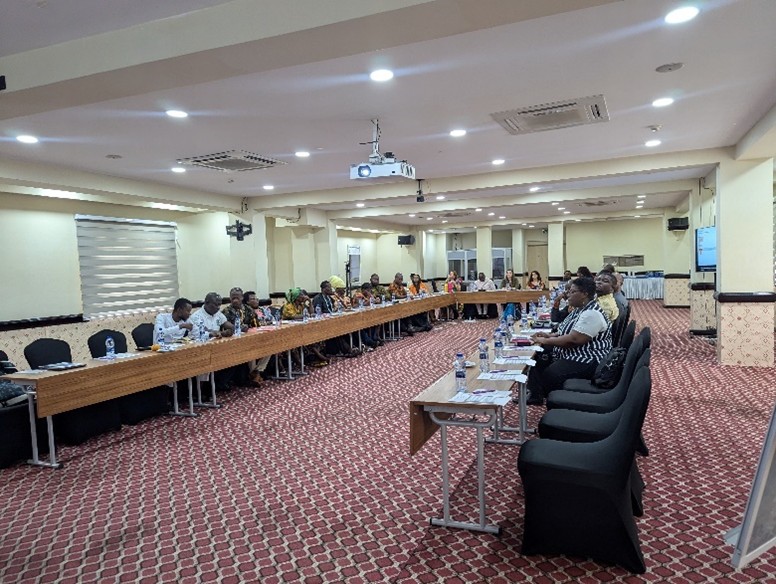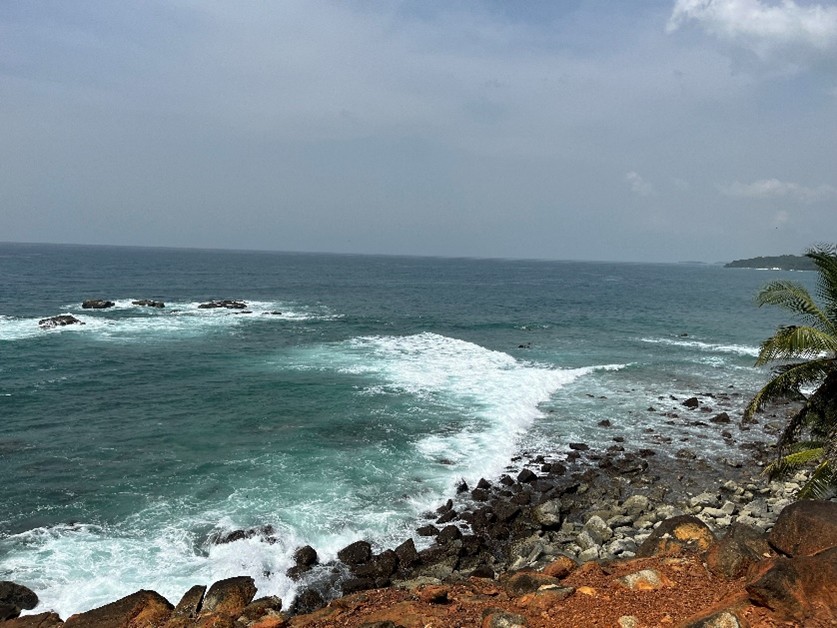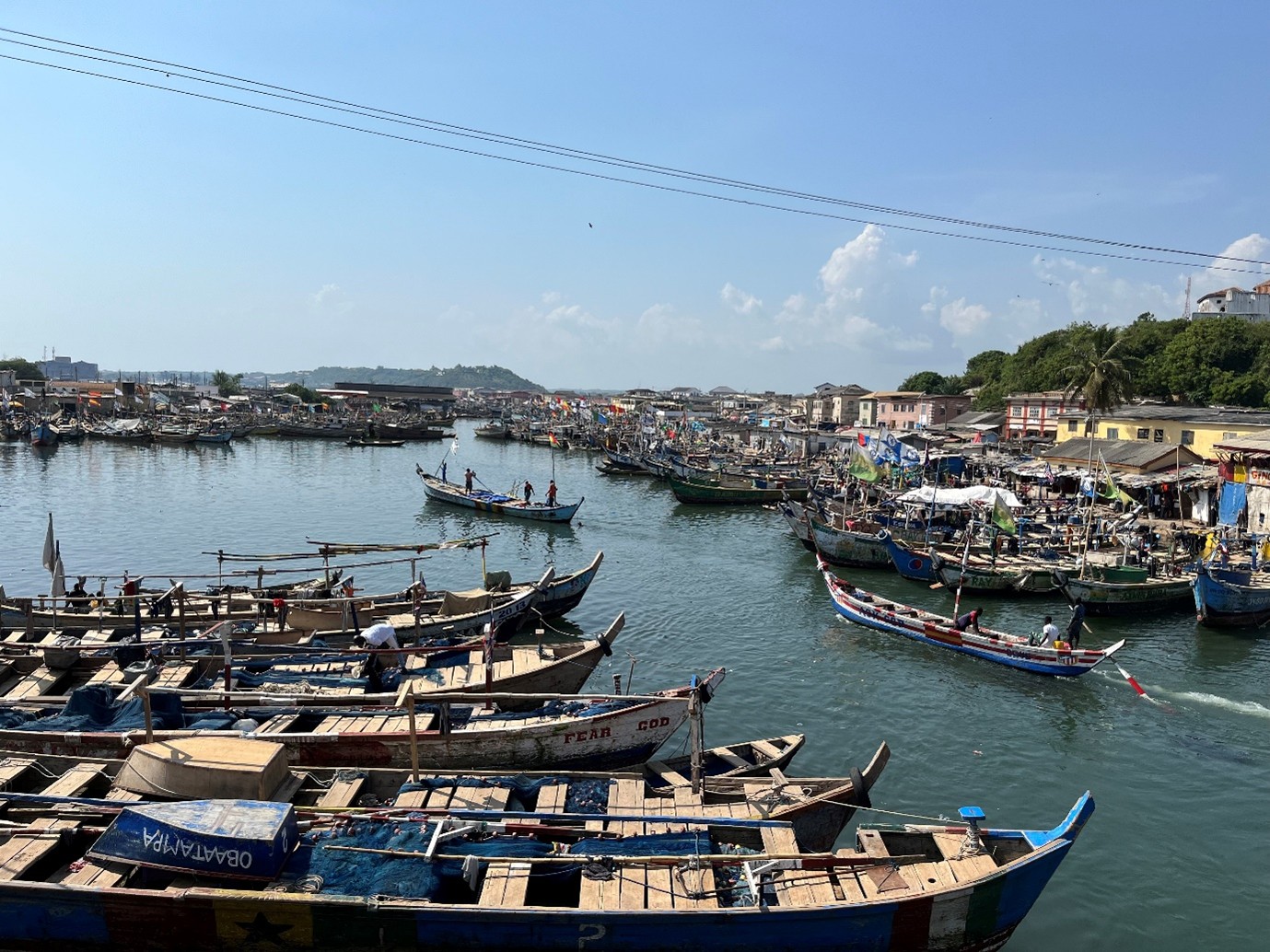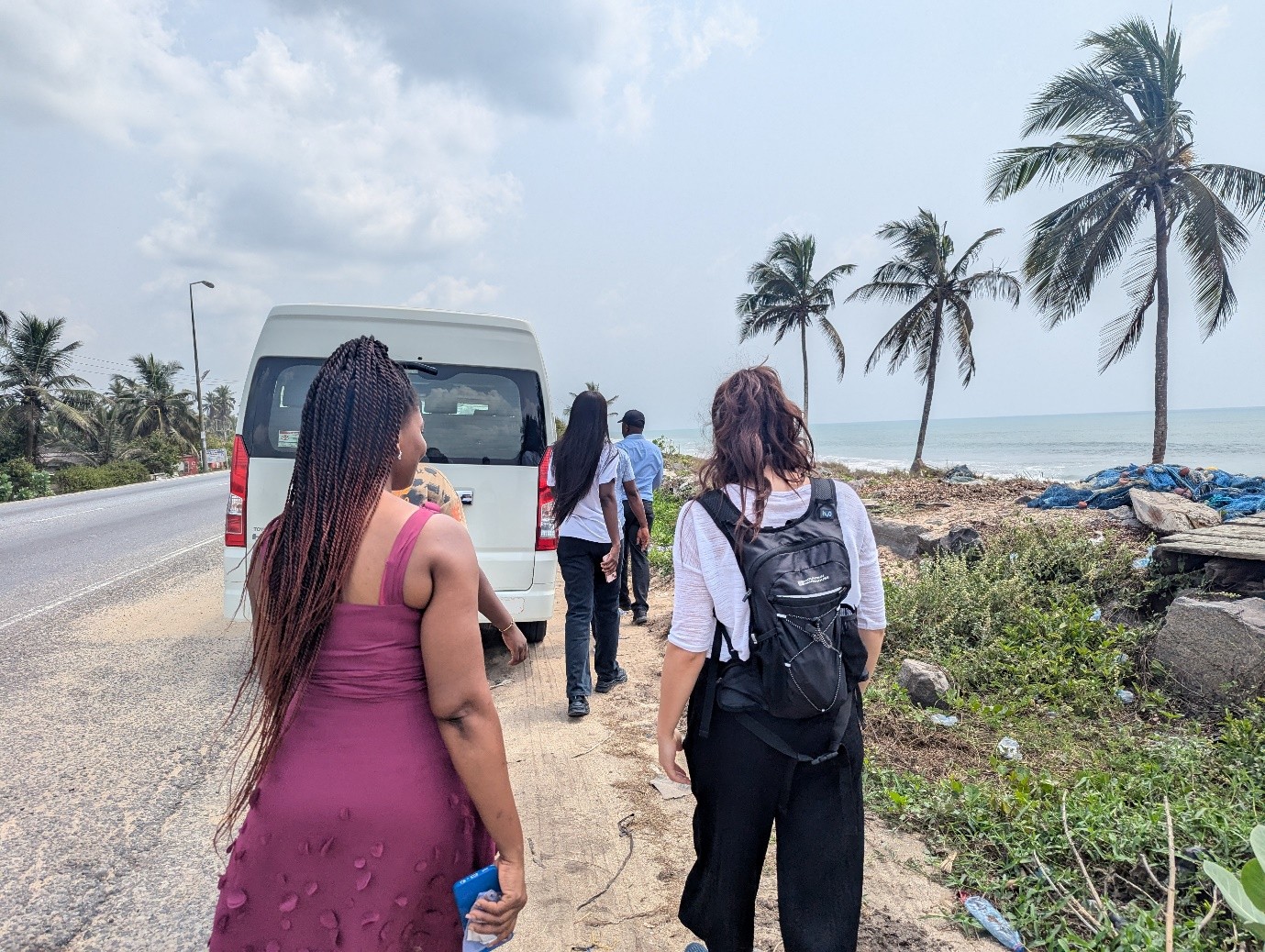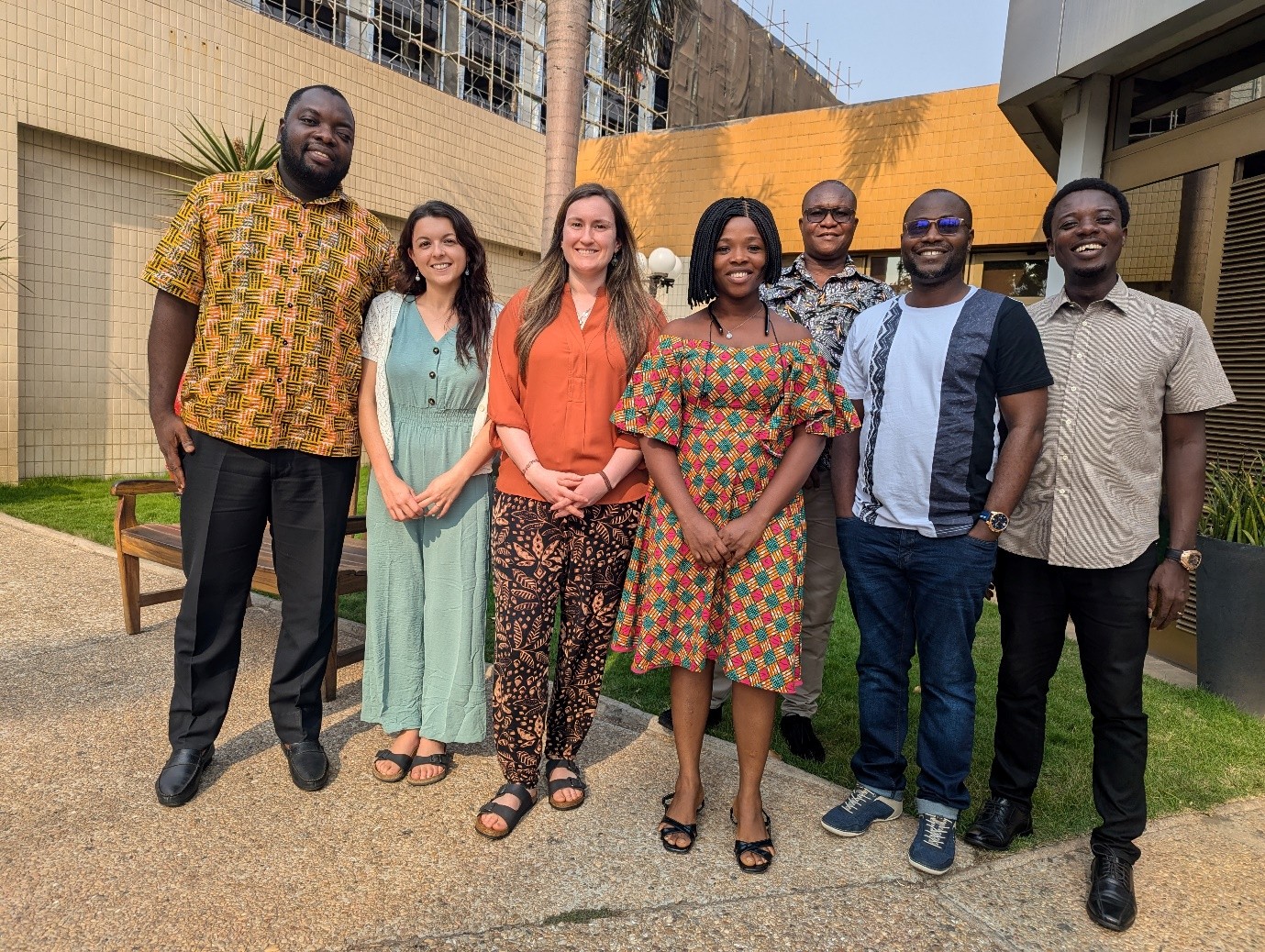The Republic of Ghana, located in West Africa, spans the Gulf of Guinea and the Atlantic Ocean to the south and shares borders with Côte d'Ivoire, Burkina Faso, and Togo. It has a coastline of approximately 550 km and an Exclusive Economic Zone of 218,000 km². Ghana is divided into 16 administrative regions, four of which are coastal (Western, Central, Greater Accra, and Volta).
With a population of around 31.7 million and rapid urbanization, coastal regions face increasing strain on resources and services. A quarter of the population is concentrated along the coast, which exacerbates environmental pressures. Additionally, 50–80% of Ghanaians rely on fish as a primary protein source, but declining stocks due to overexploitation and Illegal, Unregulated, and Unreported (IUU) fishing threaten food security. According to World Bank statistics, 3.6 million people in Ghana are already food insecure.
Ghana’s Marine Protected Area (MPA) network is still in the early stages of development , with only two designated Ramsar sites—Songor and Sakumo—covering less than 0.1% of the marine area and are classified as terrestrial sites. The Fisheries Management Plan 2020-2025 identifies MPAs as essential for restoring and sustainably managing fisheries. However, successful implementation will require setting clear objectives, strong stakeholder collaboration, and adequate resources for enforcement.
Introduction
The Ocean Country Partnership Programme (OCPP) in Ghana is delivered under the UK Government's Blue Planet Fund, which is designed to assist developing countries in managing their marine environments sustainably. This is being accomplished through mechanisms that also serve to enhance livelihoods and reduce poverty through technical assistance, capacity building, and policy support.
The OCPP team for Ghana have identified several thematic priorities for work to support Ghana in effectively managing human activities that impact the marine environment and ensure that all of their citizens can benefit from its long-term sustainable use. These include enhancing technical knowledge and capacity within key stakeholders around sustainable aquaculture practises, building capacity to prevent IUU, and supporting the establishment and implementation of MPAs by identifying gaps and identifying keys steps.
JNCC’s Ghana OCPP Work Areas
Through OCPP, JNCC's efforts have focused on supporting active endeavours to establish and implement MPAs in Ghana, and enhance knowledge on the role and importance of MPAs in marine conservation through developing education resources and materials.
The below headings summarise some of the current and past work areas undertaken across the biodiversity theme of the OCPP which JNCC have delivered cross-organisation and in partnership with the Government of Ghana
Outputs from these work areas can be viewed in the Resources section.
Stocktake of MPA Activities in Ghana
Following an OCPP-hosted MPA and Marine Spatial Planning (MSP) workshop in Ghana in February 2023, the need to develop a comprehensive stocktake of activities was identified. This stocktake should catalogue past, ongoing, and future activities, along with the responsible parties, to alleviate confusion around existing donor activities and support in-country efforts to streamline future initiatives. The OCPP developed this stocktake and produced an MPA schematic to map the progress and ambitions for MPAs in Ghana across various drivers. These resources have been shared with relevant government partners to serve as a first point of access for donor stakeholders wishing to support Ghana. This approach aims to avoid duplication of efforts and ensure that emerging programs complement, amplify, and enhance existing initiatives, fostering continued and successful progress.

Beyond MPA Designation
The OCPP contributed towards furthering understanding on the longer-term benefit of MPAs and how Ghana’s stakeholders can take action to effectively and sustainably manage their marine environment. The work entitled ‘Beyond MPA Designation in Ghana (Research and Development)’ aimed to address knowledge gaps for effective MPA implementation—particularly around management, monitoring, and community engagement—following the designation of Ghana’s first MPA, expected by 2026. The project was delivered by Hen Mpoano, a local NGO.

This work was undertaken in 2024-2025 and focused on foundational research to address knowledge gaps associated with MPA implementation in Ghana. Key outputs developed from this work included:
- A comprehensive report reviewing existing MPA implementation strategies and frameworks in Ghana
- Stakeholder mapping and gender analysis identifying key actors across the MPA implementation cycle
- A review of past MPA awareness-raising activities and existing marine environmental educational resources in Ghana
- A high-level scoping document with recommendations for future awareness and educational resource development
- A high-level framework for an MPA roadmap detailing key post-designation actions
Validation workshops and stakeholder engagements were held to ensure the outputs were inclusive and sustainable. The final documents for these activities can be found in the resource section.
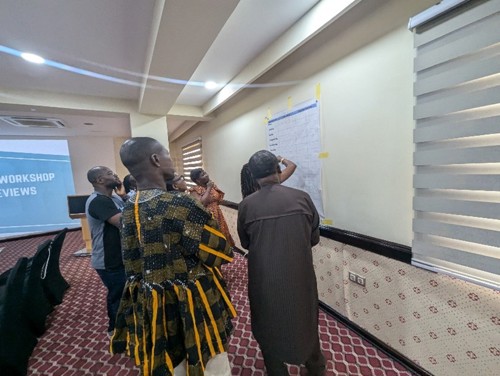
MPA Implementation Roadmap (2025 - 2026)
The OCPP will aim to use the deliverables produced from the Beyond MPA Designation: Research and Development work to develop an MPA implementation roadmap. This roadmap aims to provide a clear, comprehensive framework to accelerate effective MPA implementation in Ghana. The roadmap will look to incorporate community and stakeholder perspectives in order to amplify and integrate local voices and help to ensure MPAs are not only implemented on a scientific basis but are also socially inclusive.
MPA Short Course
The OCPP developed an introductory online learning course on Marine Protected Areas (MPAs) in partnership with the University of Cape Coast, combining lectures and self-directed learning materials. The course introduced the need for marine conservation at both national and international levels and is structured across eight modules. These cover foundational concepts, global and regional drivers (with a focus on Ghana and West Africa), MPA planning and implementation processes—including designation, management, and monitoring—and the integration of MPAs within broader marine spatial planning. The final module encourages learner reflection and action. Case studies throughout help contextualize learning. The course targets final-year undergraduate/postgraduate students, government staff, and NGO professionals. The short course was uploaded to the and shared with the UCC.
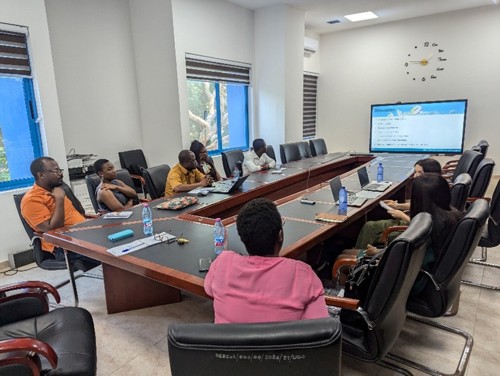
Marine Pollution Emergency Response
The OCPP funded a OSRL delivered IMO2, SCAT and IMO3 training in Ghana in March 2025. This training is essential for effective oil spill response and provides important knowledge and skills for safe and efficient operations to protect the environment and public health. The training was attended by a range of appropriate personal involved in the Emergency Response sector, and included a practical equipment deployment exercise which was organised in collaboration with the Ghana Ports and Harbour Authority.
Resources
Published pieces of work associated with the listed activities undertaken through the OCPP-Ghana partnership can be found in this section and will be added throughout the programme:
- Ocean Country Partnership Programme: Beyond MPA Designation in Ghana:
- Analytical review of Marine Protected Area (MPA) implementation policies, legislation, and strategies in Ghana: A comprehensive report reviewing existing MPA implementation strategies and frameworks in Ghana.
- Beyond MPA Designation in Ghana: Stakeholder Mapping and Gender Analysis in MPA Establishment and Implementation: Stakeholder mapping and gender analysis identifying key actors across the MPA implementation cycle.
- Review of MPA Awareness Initiatives and Marine Educational Tools in Ghana: A review of past MPA awareness-raising activities and existing marine environmental educational resources in Ghana.
- Recommendations for future MPA awareness raising and marine environmental educational tools in Ghana: A high-level scoping document with recommendations for future awareness and educational resource development.
- An MPA roadmap framework to support the implementation of MPAs in Ghana: A high-level framework for an MPA roadmap, detailing key post-designation actions.
Image Gallery
Categories:
Published:






